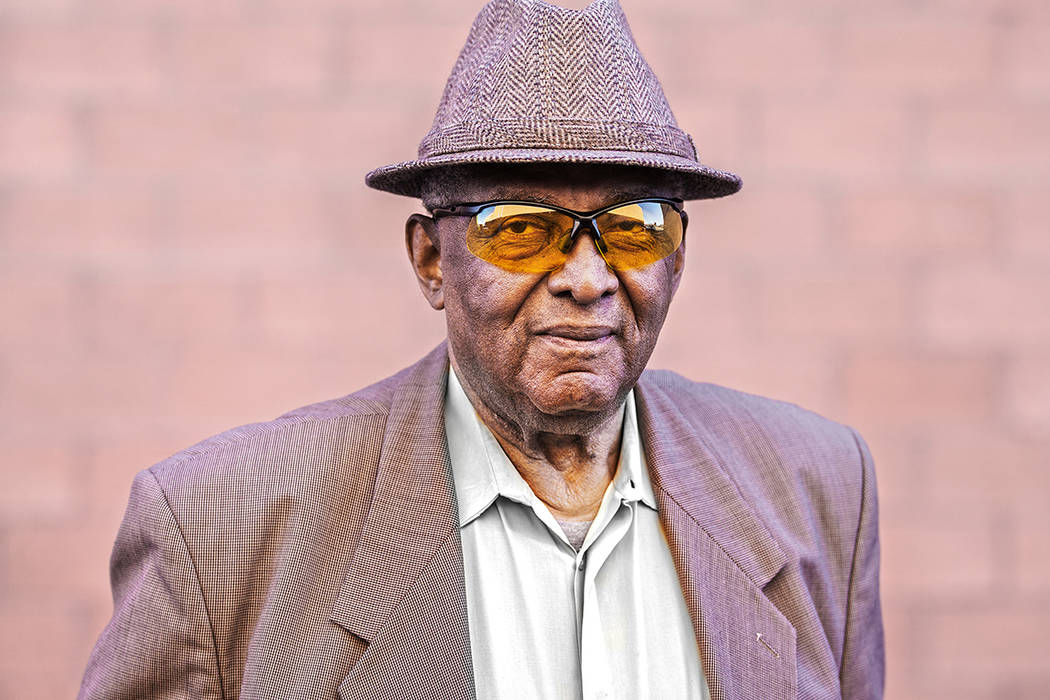Joe Neal’s legacy firmly set in history of Nevada Senate
During Black History Month, the Review-Journal is profiling prominent African-Americans in Nevada.
In February 1977, the Equal Rights Amendment looked to have no chance to pass the Nevada Senate.
Lawmakers were deadlocked over the fiercely debated resolution, which would guarantee equal rights for all citizens, regardless of sex.
Half of the state’s 20 senators supported the ERA, but 11 votes were needed for passage. In theory, a tiebreaking vote would be cast by Democratic Lt. Gov. Bob Rose, but opposing senators were choosing to abstain instead of voting no. That would prevent a tie and cause the bill to fail.
Enter Sen. Joe Neal, a Democrat representing North Las Vegas. Armed with a vast knowledge of parliamentary procedure, the freshman lawmaker invoked a more than 100-year-old bylaw known as Senate Rule 30.
The rule forced a vote on the ERA and caused abstentions to be counted as no votes. With a tie established, Rose cast the tiebreaking vote and the resolution passed the Senate.
The victory was short-lived — the ERA failed in the Assembly that year and would not be ratified in Nevada until 2017 — but Neal’s maneuver illustrated what many would come to learn about him during his 32-year tenure in the state Senate.
The trailblazing legacy left by Neal, now 83, is not limited to his distinction as Nevada’s first African-American state senator. He was a lawmaker who was often outnumbered but rarely outwitted. A tactician whose advocacy for civil rights would earn him nicknames including the “Conscience of the Legislature” and “Westside Slugger.”
“He was always a champion for the little guy,” said U.S. Rep. Dina Titus, a Democrat who served alongside Neal in the state Senate for 13 years. “He was willing to fight against any odds for what he believed was right.”
A need to be represented
Neal was born July 28, 1935, in Mound, Louisiana, a tiny town in Madison Parish west of the Mississippi River.
He first moved to Las Vegas in 1954 after graduating from high school, following his mother and older brother to live in the segregated Las Vegas Westside neighborhood near downtown. The same year he joined the Air Force so he could earn GI Bill benefits and pay for a college education he otherwise could not afford.
In 1961, Neal enrolled as a political science student at Southern University in Louisiana, where he joined other students in demonstrations during the civil rights movement.
“Blacks did not have any rights that whites would respect at that time, so you had to force that upon them and make sure we were not invisible,” Neal said. “Back then, they would send you into service to fight, and they would not give you the right to vote.”
Neal returned to Las Vegas and eventually found work as an equal opportunity compliance officer for Reynolds Electrical & Engineering, one of Southern Nevada’s largest employers.
He was tasked with integrating the company in accordance with the Civil Rights Act of 1964, but he also used the position to fight discriminatory hiring practices at North Las Vegas City Hall and local labor unions.
Around the same time, Neal began vying for political office. He was walloped in 1966 when he ran for state Senate and beaten again when he tried for the Assembly in 1970.
But a pivotal change happened the following year. The Legislature redrew political districts, an effort Neal said he influenced from the outside, creating a Senate district with a majority of black voters.
Neal defeated Republican Woodrow Wilson, the first African-American elected to the Assembly, in the 1972 race for Senate District 4. He credited the victory to a tireless door-to-door campaign in black neighborhoods.
“You had to make an appeal to people that were coming here that there was a need to have blacks be represented into the structure,” Neal said. “I said one thing: I will never embarrass you, and I will do the right thing in terms of service to you and the community.”
When he wasn’t in Carson City, Neal kept the North Las Vegas home he lived in with his wife, Estelle, and five children open to constituents.
“Our living room was his office,” said his youngest daughter, Assemblywoman Dina Neal. “It was open all the time.”
Fighter on the floor
Neal was a fighter from the day he walked into the Legislature, never afraid to be the lone vote cast on the losing side of an issue.
But Neal said he never saw losing as losing. A skilled orator, he saw defeat as an opportunity to put his issues with a bill on the record, even if it earned him the nickname “19-to-1” from his colleagues.
“My whole makeup at getting elected to the Senate was not to go along to get along,” he said. “People thought maybe I would sit in the background and just vote and stay along with the party structure, but I didn’t do that.”
Neal saw plenty of victories, too.
The first piece of legislation he championed and passed was a 1973 bill that restored the rights of felons. Two years later, he successfully fought legislation that would have made it a felony to carry a “cake-cutter” Afro comb, which some lawmakers tried to paint as a dangerous weapon.
The 1980s were an even more fruitful decade for Neal. After 85 people died in a fire at the MGM Grand in November 1980, he led the charge to pass improved fire-safety codes that became a model for the rest of the nation. There was also a compact between Nevada and California in 1980 to better keep Lake Tahoe clean, and $20 million in bonds were allocated to build libraries across the state.
Neal credits much of his success to Mason’s Manual of Legislative Procedure, which he studied meticulously from his first year in the Senate. He saw the book as fertile ground for a new lawmaker to make his voice heard.
“I used to take that book and beat ’em up on it,” he said.
A real legacy
After serving 16 regular legislative sessions and seven special sessions, Neal retired in 2004 following an unsuccessful run for governor two years prior.
Neal sees himself as a trailblazer.
Black men now lead both houses of the Nevada Legislature: Senate Majority Leader Kelvin Atkinson and Assembly Speaker Jason Frierson.
Last year, Attorney General Aaron Ford became the first black candidate to win statewide executive office in Nevada. In 2010, Neal’s daughter Dina became the first black woman elected to the state Assembly.
“I kind of wonder what would have happened if I had not been there and done what I did,” Neal said. “Took the slings and arrows, as Shakespeare would say.”
Dina Neal said her father’s political career may be over, but his name is as strong as ever. Rare is the day that someone does not approach her with a story about how “Senator Neal,” not Joe, helped them or their family.
“I didn’t realize how big his imprint was. He has affected thousands of people,” Dina said. “The legacy is actually real.”
Contact Michael Scott Davidson at sdavidson@reviewjournal.com or 702-477-3861. Follow @davidsonlvrj on Twitter.

























